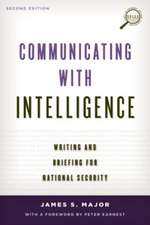Handbook of European Intelligence Cultures: Security and Professional Intelligence Education Series
Autor Bob de Graaff, James M. Nyceen Limba Engleză Hardback – oct 2016
Din seria Security and Professional Intelligence Education Series
- 19%
 Preț: 388.07 lei
Preț: 388.07 lei -
 Preț: 307.02 lei
Preț: 307.02 lei - 21%
 Preț: 398.54 lei
Preț: 398.54 lei -
 Preț: 361.07 lei
Preț: 361.07 lei -
 Preț: 245.85 lei
Preț: 245.85 lei -
 Preț: 245.63 lei
Preț: 245.63 lei - 19%
 Preț: 357.93 lei
Preț: 357.93 lei - 19%
 Preț: 357.77 lei
Preț: 357.77 lei -
 Preț: 310.02 lei
Preț: 310.02 lei -
 Preț: 320.46 lei
Preț: 320.46 lei - 27%
 Preț: 1068.49 lei
Preț: 1068.49 lei - 27%
 Preț: 708.40 lei
Preț: 708.40 lei - 23%
 Preț: 700.99 lei
Preț: 700.99 lei - 27%
 Preț: 797.29 lei
Preț: 797.29 lei -
 Preț: 361.69 lei
Preț: 361.69 lei -
 Preț: 330.06 lei
Preț: 330.06 lei - 23%
 Preț: 516.30 lei
Preț: 516.30 lei -
 Preț: 539.85 lei
Preț: 539.85 lei -
 Preț: 537.17 lei
Preț: 537.17 lei -
 Preț: 541.02 lei
Preț: 541.02 lei - 23%
 Preț: 514.65 lei
Preț: 514.65 lei -
 Preț: 391.13 lei
Preț: 391.13 lei -
 Preț: 326.19 lei
Preț: 326.19 lei - 23%
 Preț: 691.85 lei
Preț: 691.85 lei - 27%
 Preț: 711.14 lei
Preț: 711.14 lei - 27%
 Preț: 737.81 lei
Preț: 737.81 lei - 23%
 Preț: 587.02 lei
Preț: 587.02 lei -
 Preț: 480.65 lei
Preț: 480.65 lei - 23%
 Preț: 458.07 lei
Preț: 458.07 lei - 27%
 Preț: 762.17 lei
Preț: 762.17 lei - 23%
 Preț: 453.40 lei
Preț: 453.40 lei -
 Preț: 538.14 lei
Preț: 538.14 lei -
 Preț: 506.89 lei
Preț: 506.89 lei - 23%
 Preț: 508.22 lei
Preț: 508.22 lei - 27%
 Preț: 813.93 lei
Preț: 813.93 lei -
 Preț: 349.98 lei
Preț: 349.98 lei
Preț: 764.37 lei
Preț vechi: 992.68 lei
-23% Nou
146.31€ • 158.98$ • 122.98£
Carte disponibilă
Livrare economică 01-15 aprilie
Livrare express 15-21 martie pentru 43.18 lei
Specificații
ISBN-10: 1442249412
Pagini: 532
Ilustrații: 32 black & white halftones
Dimensiuni: 152 x 229 x 34 mm
Greutate: 0.86 kg
Editura: Rowman & Littlefield
Seria Security and Professional Intelligence Education Series
Descriere
Featuring 32 countries (such as Albania, Belgium, Croatia, Norway, Latvia, Montenegro), Handbook of European Intelligence Cultures provides insight into a number of rarely discussed national intelligence agencies for a comparative study that offers hard to find information into one volume. The contributors, who are all experts from the countries discussed, address the intelligence community rather than focusing on a single agency. Each entry looks at the environment in which an organization operates, its actors, and cultural and ideological climate, to cover both the external and internal factors that influence a nation s intelligence community."






















